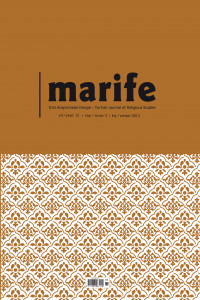Abstract
İbnü’l-vakt kavramı, Tasavvuf kültürünün en önemli ve hayatı anlamlı kılan kavramlarından birisidir. Aslında hayatta başarılı ve mutlu olmanın, yaşanılan zaman dilimine manalı ve tatminkâr bakabilmenin yolu, ibnü’l-vakt kavramının farkına varmak ve tecrübe etmekten geçer. Çünkü ibnü’l-vakt olmak, geçmişin sıkıntılarını ve geleceğin kaygılarını yaşadığımız zaman dilimine taşımama yeteneği ve tecrübesidir. Bu tarz insanlar, geçmişleriyle barışık ve geleceklerine güvenle bakarlar. Bu nedenle ibnü’l-vakt olmayı başararak zamanlarını mutlu ve tatminkâr bir bakış açısıyla değerlendiren insanlar duygusal çatışmalarını çözmüş olurlar. Yine onlar mevcut kaygı ve kişilik bozukluklarını, akut zihin bulanıklıklarını, anormal davranış kalıplarını, öğrenilmiş çaresizliklerini ve yaşadığımız zaman dilimini en iyi tarzda değerlendirme imkânı veren ibnü’l-vakt olma yoluyla tedavi ve terapi ederler. Aynı zamanda ibnü’l-vakt olmak, kişinin kendini-keşfetme, benlik arayışında ve bilişsel tutarlık kazanmasında yardımcı bir unsurdur
Abstract
Understanding in Terms of Sufism and Psychology, the Effects of Ibnu’l-Vakt Ibnu’l-vakt concept is one of the most important issues of Islamic Sufism culture which makes life meaningful. In fact the way of being successful and happy in life, viewing ex- perienced life as meaningful and satisfactory takes place through the experiencing and understanding the term of Ibnu’l-vakt. Because being Ibnu’l-vakt is the ability to not car- rying the problems of past and concerns of the future to our life. Such people, at peace with their past and look to future with confidence. For this reason people who accomplish being Ibnu’l-vakt and spending their time as happy and satisfac- tory solve their emotional conflict. Again they treat and cure their existing anxiety and personal disorders, acute mind blur abnormal patterns of behavior, learned helplessness by being Ibnu’l-vakt which is ability to best avoluation of our life span. In the same time being Ibnu’l-vakt is a supportive understanding in person’s self discovery, self seeking and having cognitive consistency
Details
| Primary Language | Turkish |
|---|---|
| Subjects | Religion, Society and Culture Studies |
| Other ID | JA52UD82FJ |
| Journal Section | Research Article |
| Authors | |
| Publication Date | December 15, 2012 |
| Published in Issue | Year 2012 Volume: 12 Issue: 3 |
This work is licensed under a Creative Commons Attribution-NonCommercial 4.0 International License.

